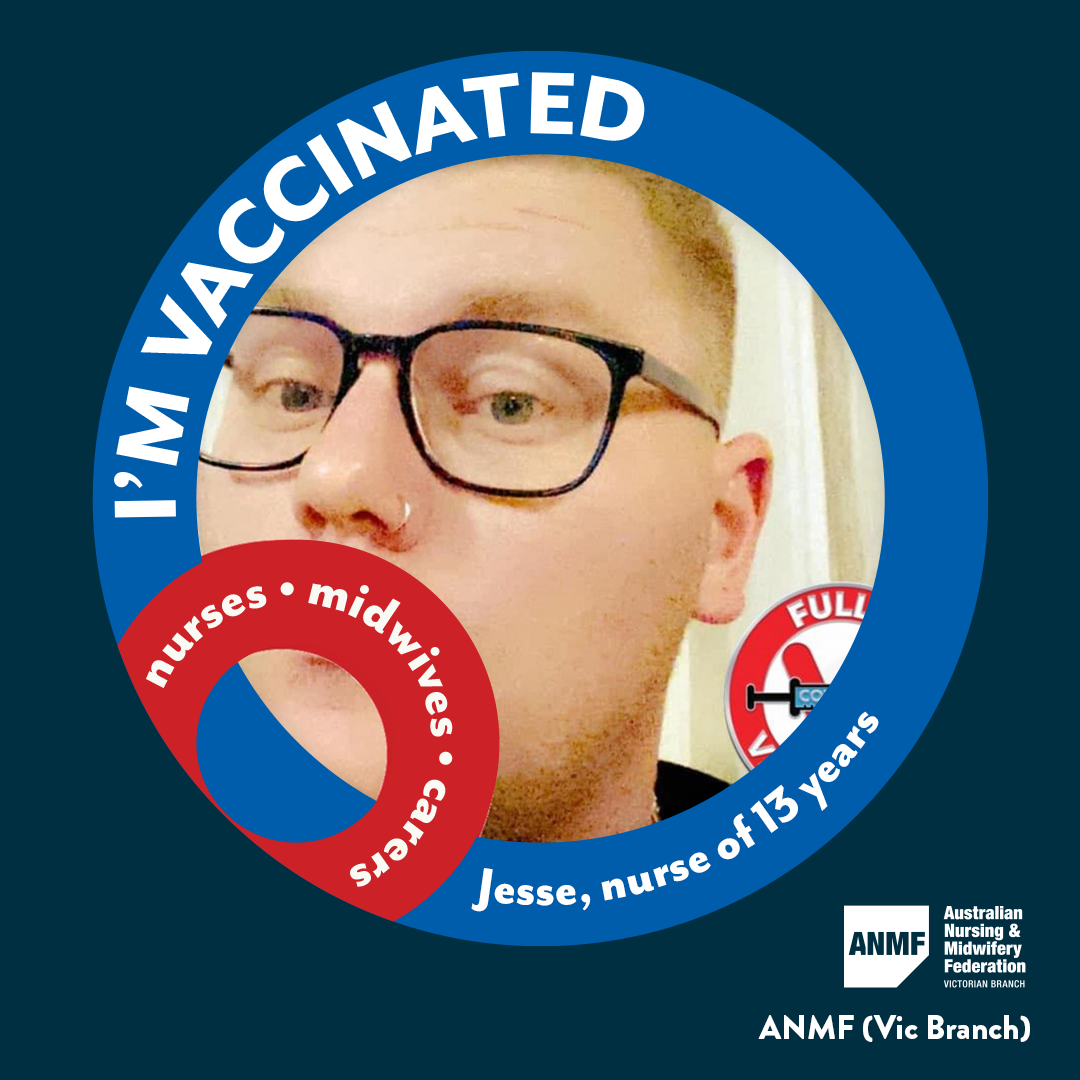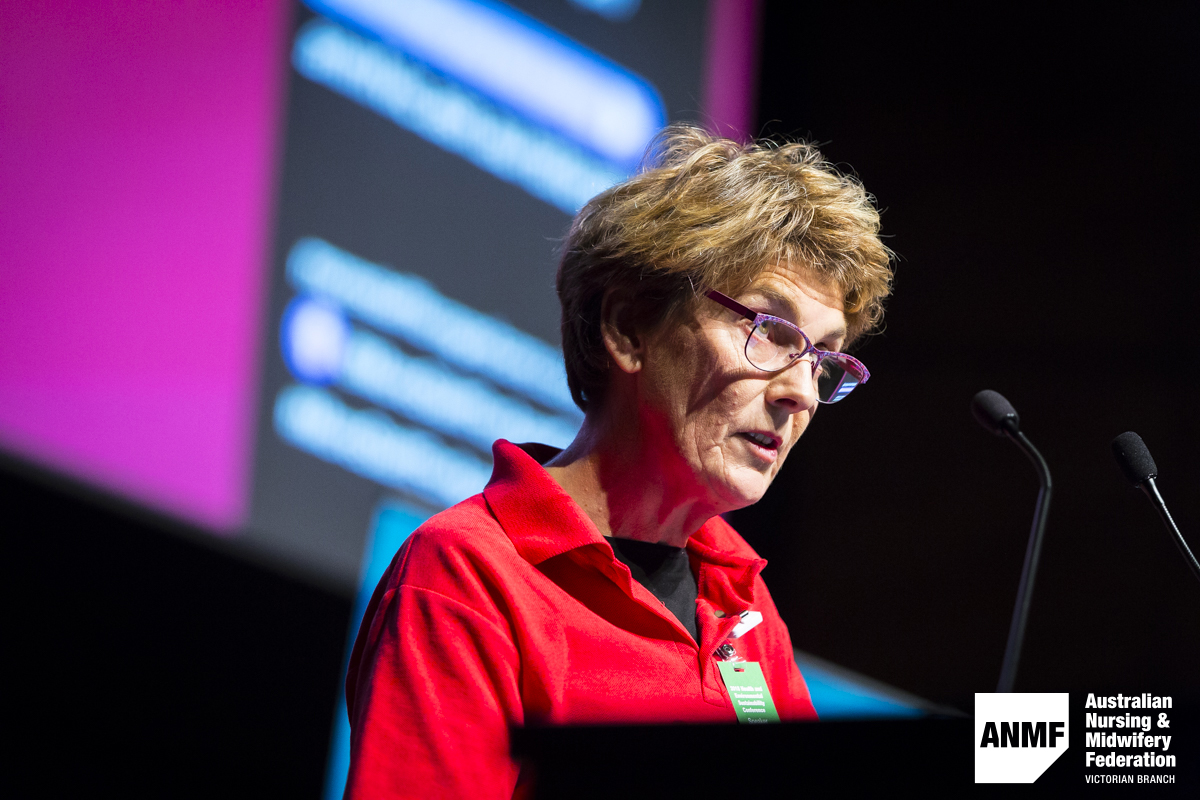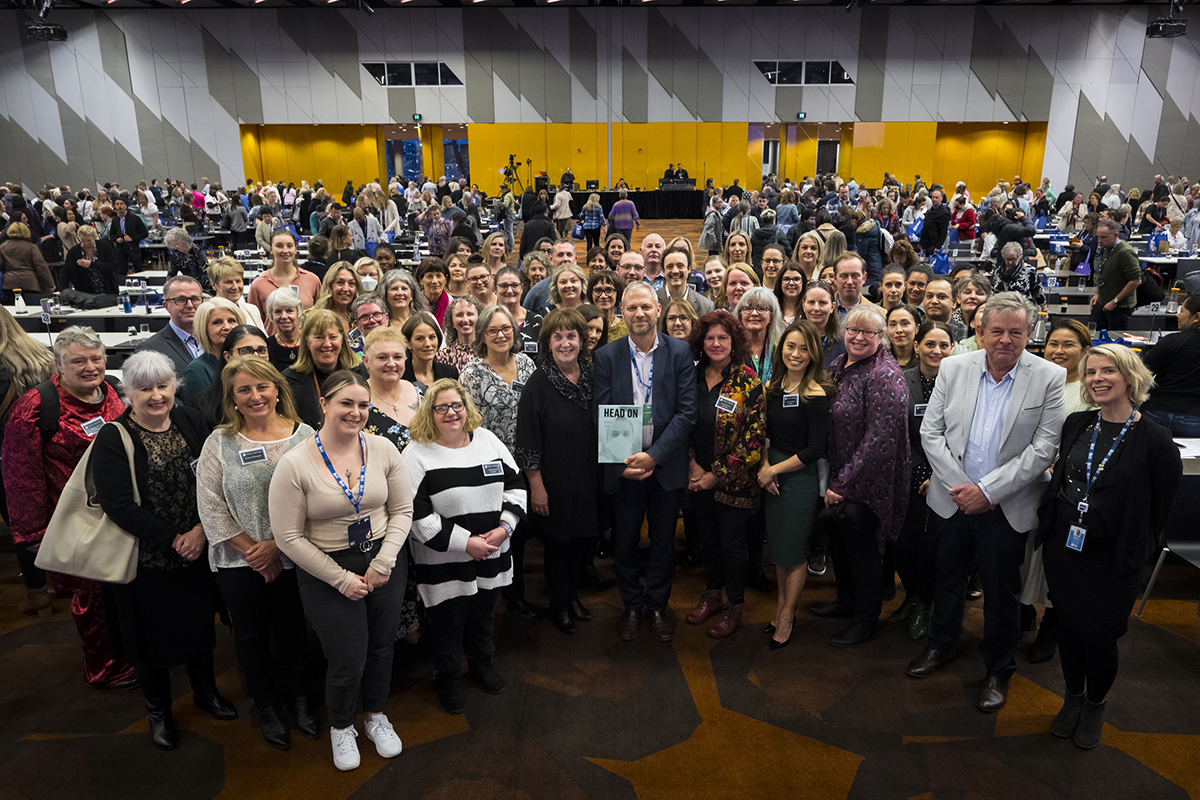2021 began with experts hosing down our hopes that the new year would be better, compared to the previous one.
It was different, thanks to development of vaccines. It was also the same, as we recorded our first cases of community transmission 60 days after the end of the second wave. Restrictions were tightened and our New Year’s Eve parties got a little smaller with the cap on visitors to the home reduced from 30 to 15. It was a sign of things to come as Victorians moved in and out of lockdown throughout 2021.
Vaccines bring hope
The Therapeutic Goods Association approved the Pfizer vaccine on 25 January and the AstraZeneca vaccine on 16 February. Victorian nurses and midwives put their hands up to undertake additional education to be able to provide the vaccine at the Victoria Government’s state vaccination hubs.
Nurses and midwives were also prioritised in Phase 1a of the Morrison Government’s vaccine schedule. Aged care nurses and personal care workers were included in Phase 2b.
Federal Health and Aged Care Minister Greg Hunt promised that private aged care nurses and personal care workers would be vaccinated at work in a program that would take six weeks to roll out. It did not turn out that way. By June, ANMF (Vic Branch) was calling for Federal Aged Care Services Minister Richard Colbeck’s resignation after he told a Senate Estimates Committee he was ‘comfortable’ with the private aged care vaccination but had no oversight on how many staff had been vaccinated. Nurses and carers organised their own vaccination and by the end of September 98.9 per cent of residential aged care workers had received their first dose.
As 2021 drew to a close, the third dose vaccination program was ramping up, with nurses, midwives and personal care workers encouraged to have theirs as soon as they become eligible.
Two royal commissions
Prime Minister Scott Morrison released the 2800-page aged care royal commission final report at a media conference on 1 March. The report has 148 recommendations.
The Morrison Government announced a further $452.2 million to address ‘immediate priorities’ in aged care. This was on top of the $1.8 billion COVID-19 pandemic package provided in 2020. A further $17.7 billion over four years was announced in the May federal budget, but mandated increases to staffing levels were postponed to 2023 when they become law under new aged care legislation.
Despite the extra billions, aged care nurses and personal care workers have not seen any additional staff at the bedside nor wage increases.
In March, Victorian members joined an important delegation to the nation’s capital calling for staffing ratios to be included in the Federal May budget. Registered nurses, enrolled nurses and personal care workers working in private aged care met with independent, ALP and Greens politicians at Parliament House. Prime Minister Morrison refused to meet with the members.
ANMF launched its new ‘not too much’ campaign in April, revealing how staffing ratios would help residents who missed out on pain relief or mealtime assistance. Television and radio advertisements aired across the country, including metropolitan and regional Victoria. Three mobile billboards took the important message to the electorates of Federal Treasurer Josh Frydenberg (Kooyong), Federal Health and Aged Care Minister Greg Hunt (Flinders) and Federal Shadow Minister for Senior Australians and Aged Care Services Clare O’Neil (Hotham). ANMF and its members continue to campaign for the government to urgently respond to the commission’s findings that resident care is compromised by understaffing.
The Branch ran further television, radio and social media advertising in December to ensure the community understood aged care was not fixed despite the extra billions of dollars.
A federal election must be held by May 2022. Our national campaign is now calling on members and the community to ask their federal local MP if they support ANMF’s four key aged care reforms:
- registered nurse onsite 24 hours per day
- greater transparency – funding tied to care
- minimum mandated care hours and the right skills mix (guaranteed ratios)
- improved wages and conditions.
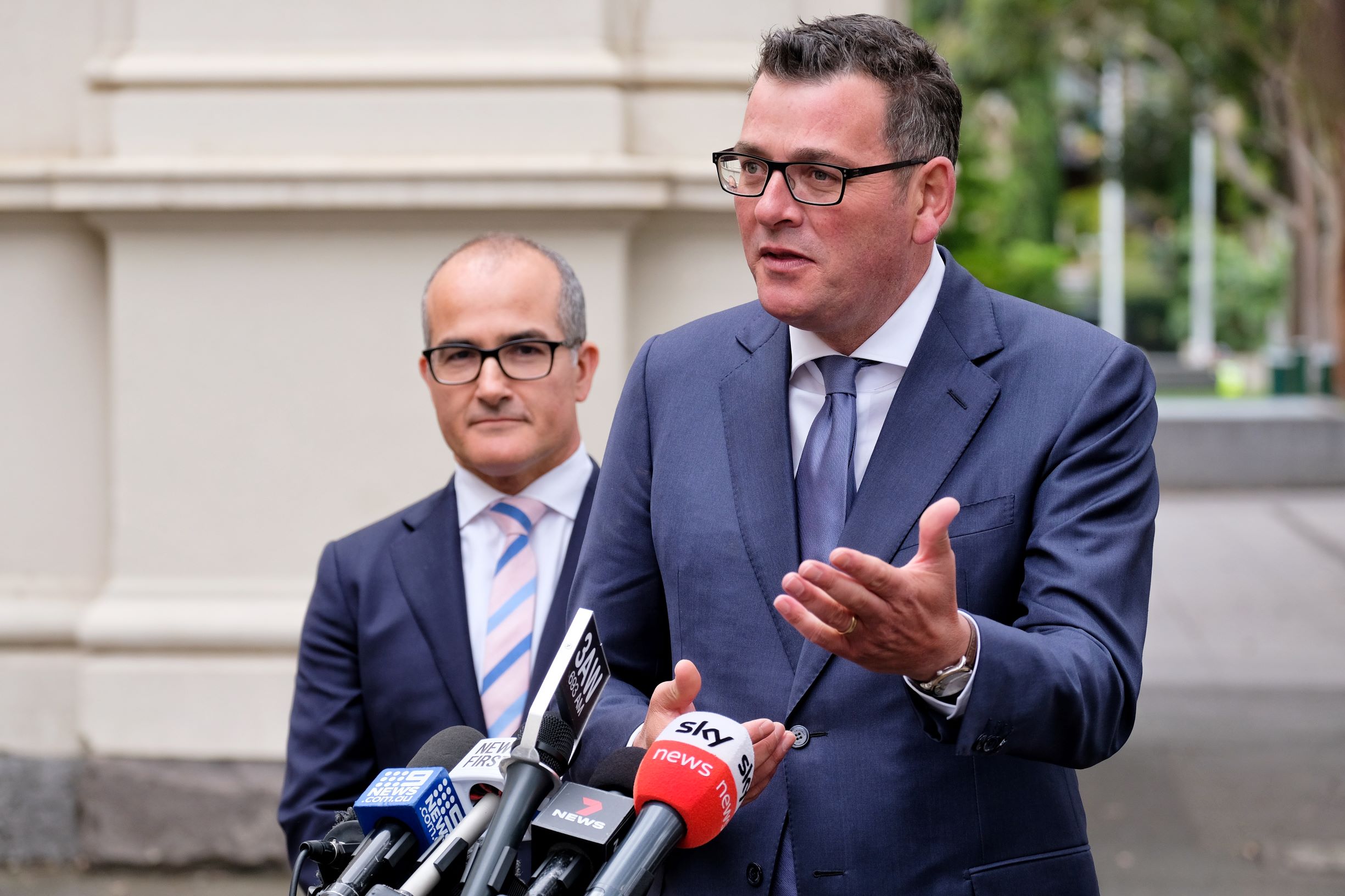
Premier Daniel Andrews and Mental Health Minister James Merlino speaking to media about the release of the final report. Premier Andrews has promised to implement all recommendations. (AAP Image/Luis Ascui)
Also in March, the Victorian Andrews Government released the mental health royal commission final report and reconfirmed its promise to implement all 65 recommendations. In the May state budget the Andrews Government announced $3.8 billion to start to ‘rebuild the mental health system from the ground up’. A new Mental Health and Wellbeing Act, to underpin the reforms, is scheduled to be in place by mid-2022.
ANMF established its Mental Health Royal Commission Working Group, comprising mental health nurse members, to inform our implementation consultations with the government. This ensures mental health nurses have a voice in the development of a system with compassionate, trauma-informed care and early intervention at its heart.
A delayed celebration of nurses and midwives
Unmasked, the exhibition designed to celebrate the international year of the nurse and the midwife – delayed by the pandemic – was opened by Victorian Premier Daniel Andrews in early March. The exhibition, at Her Place Museum in East Melbourne, drew on nursing and midwifery’s rich history, contemporary pandemic experiences and immeasurable contribution in Victoria.
COVID-19 prevented a tour of regional Victoria so ANMF began work to assist Her Place create a digital version of the exhibition.
Unmasked was funded by the Victorian Government, hosted in partnership with the Department of Health and Human Services and Safer Care Victoria, and was supported by the Australian Nursing and Midwifery Federation (Victorian Branch). The exhibition received an Australian Museum and Galleries Association award in October.
Healthcare worker heavy toll
Nurses were among the workers remembered on International Workers’ Memorial Day on 28 April. The International Council of Nurses says 2262 nurses died from COVID-19 in 2020. In October, the ICN reported that 115,000 healthcare workers had died between January 2020 and May 2021, calling on governments across the world to collect better data. Media reported a Victorian disability nurse, Sumith Premachandra, died of COVID-19 on 5 April 2020.
It was with the heaviest of hearts ANMF responded to the news that on 28 November 2021, Angliss Hospital emergency nurse Jill Dempsey had died after contracting COVID-19. Jill’s death was a sobering reminder of the vulnerability of nurses and midwives. Jill’s Eastern Health colleagues (who organised a go fund me fundraiser), and her friends and family continue to be in our thoughts.
Negotiating wages and conditions
The final steps of the 2020–24 public sector nurses and midwives enterprise agreement were delayed by a dispute over who it covered. In June, the Victorian Department of Health advised all terms of the new EBA would be implemented by administrative action including superannuation on the unpaid component of parental leave, improved parental leave entitlements, increases to allowances, the lead apron allowance, qualification allowance improvements, special disaster leave, defence service leave and change of roster allowance. The second three per cent pay rise of the four-year agreement was due on or from the first full pay period from 1 December. A ballot of all employees was held in early December. Of those who voted, 98.5 per cent voted to approve the agreement.
Public sector mental health EBA negotiations continued throughout 2021 at a frustrating pace. Negotiations came to a conclusion following a statewide member meeting on 11 October, which endorsed an improved final offer from the Andrews Government. The proposed agreement includes a 10.5 per cent wage increase over four years,maintaining pay parity with public sector nurses and midwives. Mental health nurse members also achieved all of the same important improvements to conditions and entitlements.
EBA negotiations for ANMF members across Victoria’s private hospitals are almost complete, with the majority achieving pay parity with the public sector. Members also secured many of the new public sector entitlements including superannuation payments on the paid and unpaid component of parental leave and earlier access to long service leave.
ANMF also began negotiations for improved wages and conditions for about 9000 members in private aged care facilities. Members are claiming improved wages, staffing levels, skill mix, time to care, secure work and safe workplaces. In December, ANMF began a mobile billboard campaign to support members in their EBA negotiations. The Morrison Government appears to be in no hurry to fix the issues of inadequate staffing and poor wages, so the enterprise bargaining process gives union members another opportunity to make improvements.
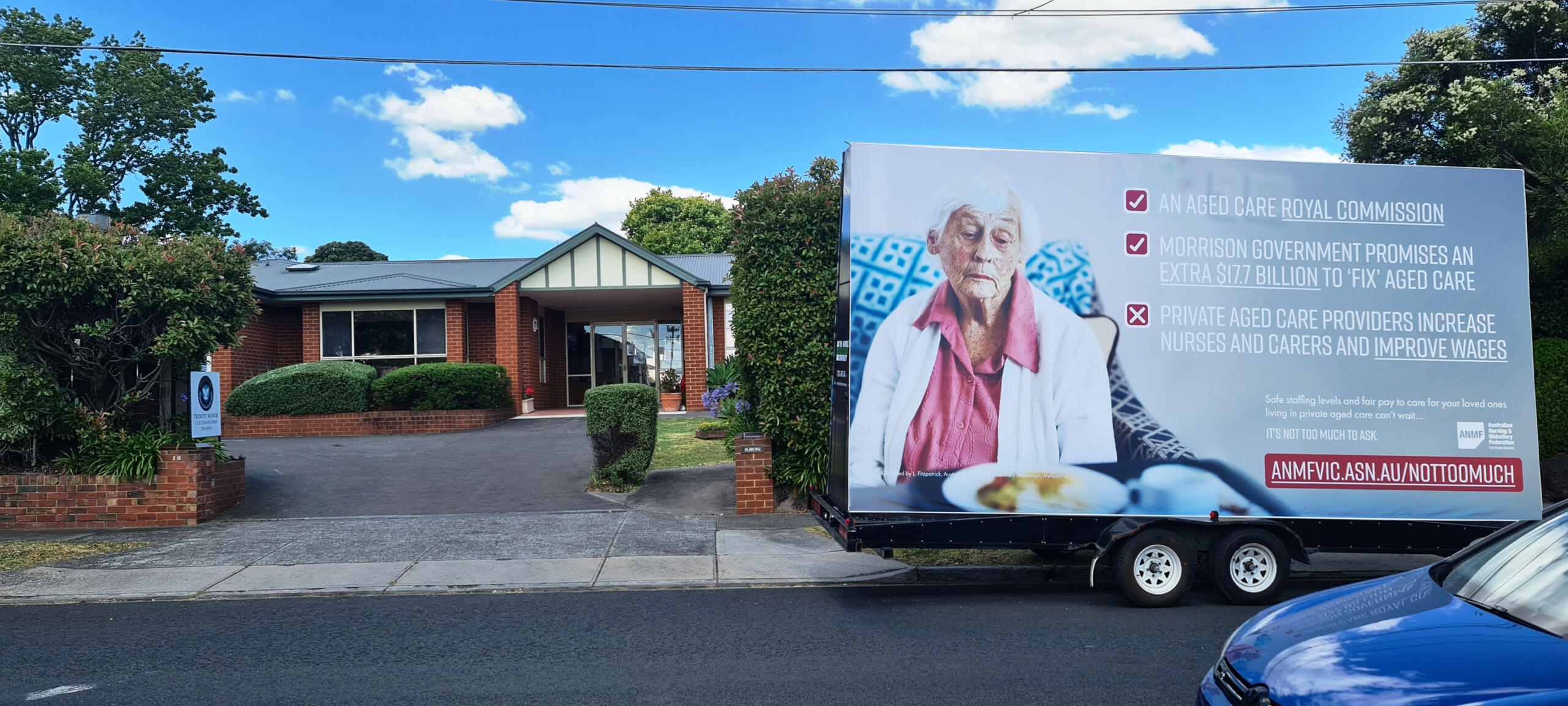
Trinity Care’s Trinity Manor Burwood
Delegates Conference returns
After having to cancel the 2020 Annual Delegates Conference, the important two-day event – which guides the direction of ANMF for the coming 12 months – returned in 2021, albeit online.
Congratulations again to the recipients of the 2020 and 2021 Job Rep of the Year Awards: Mary Natoli from cohealth; Naomi Takita from the Medically Supervised Injecting Room; Michelle Wagner from Cranbourne Integrated Care, Monash Health. And also to the Health and Safety Reps also for the same two-year period: Yvonne Austin from Northern Health; Ann-Marie Thompson from Mercy Hospital for Women; Caroline Kennedy from University Hospital Bellarine Centre; and Kellie Carracher from St John of God.
Advocacy
Throughout the year, ANMF and its members continued to support numerous campaigns to improve the lives and health of vulnerable people. These include the ‘Raise the age’ campaign to stop children as young as 10 years old from being imprisoned. We also supported the School Strike 4 Climate’s ‘Fund our future, not gas’ campaign and march.
COVID-19 pandemic – the second year
Nurses, midwives and carers began 2021 exhausted from Victoria’s brutal second wave. Despite our desire for it to be over, the pandemic dominated every aspect of our members’ lives and the work of the ANMF.
Members worked relentlessly across our health services, hotel quarantine, testing and vaccination hubs.
Brief lockdowns occurred in the first half of the year, with private aged care nurses and personal care workers moving in and out of single-site employment restrictions.
By mid-July all healthcare services had moved to the COVID ACTIVE (red) risk rating and people across the state could only leave home for five reasons. After a small reprieve, health services moved to COVID PEAK (black) by late August and Melbourne was in lockdown again.
ANMF launched its ‘I’m vaccinated’ campaign so trusted members could help spread the word that the COVID-19 vaccines were effective and reduced the chances of severe illness, hospitalisation and death. Thank you to every single member who shared the information, used the campaign Facebook frame and sent us a photo and your reason for getting vaccinated. You made a difference.
ANMF lobbied hard to ensure the Andrews Government commissioned modelling on the impact of easing restrictions under the national cabinet’s plan. We had to be sure decision-makers monitored hospitalisations and the risk of overwhelming the health system and the workforce.
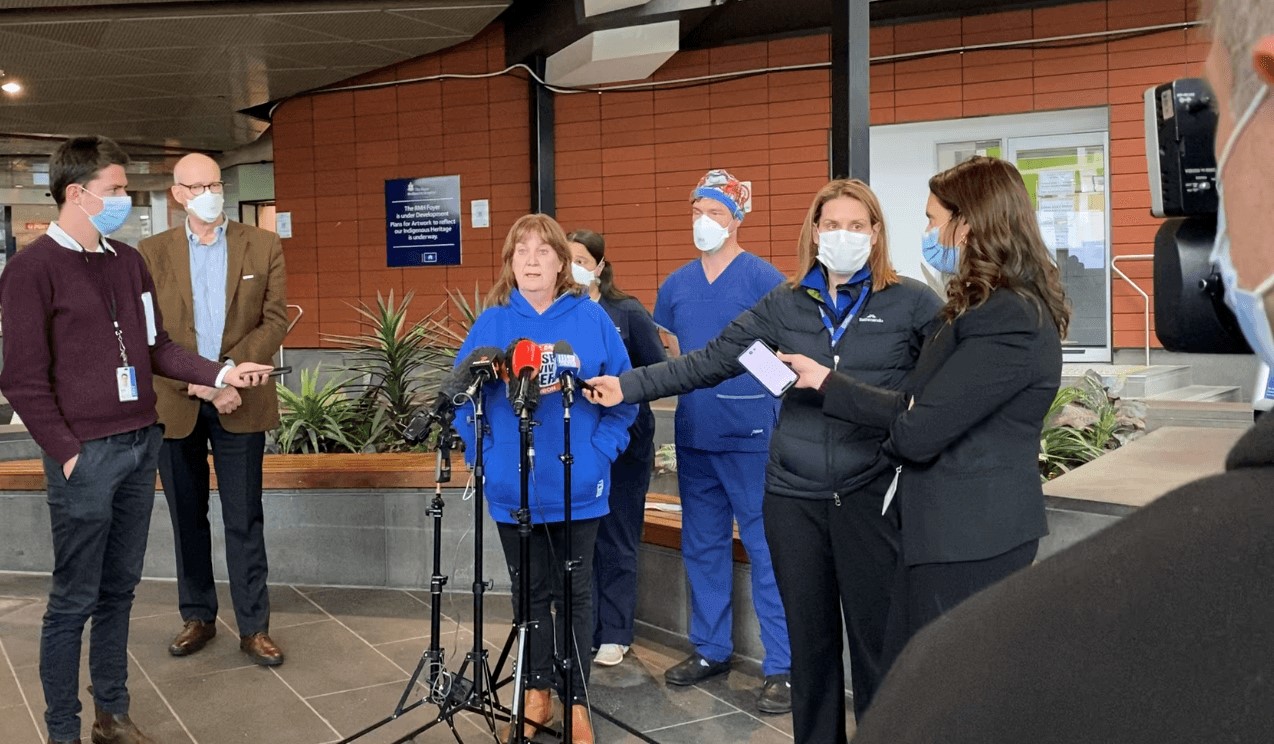
ANMF (Vic Branch) Secretary Lisa Fitzpatrick addressing the media.
We spoke out in September when extraordinary violent protests broke out across the streets of Melbourne and called for calm and kindness to return. In November we reminded Victorians and our politicians that the pandemic bill – to replace the state of emergency laws – was actually about people’s health, the health system and the capacity of the workforce to care for COVID and non-COVID patients.
After months of negotiations, ANMF secured a per-shift hospital surge support allowance for nurses and midwives working in patient-facing areas. ANMF continues to iron out the final details based on the important feedback members provided following the statewide Job Rep and HSR meeting on 14 October. The allowance is scheduled to be in place between October 2021 and February 2022. [Edited – this allowance was extended to 31 March 2022]
Between October and December, the ANMF Education Centre re-ran our popular ‘Re-orientation to acute care’ workshops to support nurses returning to clinical areas as part of the surge workforce. We originally offered these courses at the start of the pandemic in 2020.
If there is a silver lining, it would be the pandemic’s acceleration of the nursing and midwifery student employment model – an ANMF initiative. Registered Undergraduate Students of Nursing (RUSONS) and Registered Undergraduate Students of Midwifery (RUSOMs) have made a significant contribution to the pandemic surge workforce. When we look at the achievements of this program we are so very grateful that we won the longest industrial relations campaign in our history, which began ten years ago in October 2011. By March the following year, the ‘Respect our Work’ EBA campaign had stopped the Baillieu/Napthine Liberal Government from replacing nurses and midwives with unqualified health assistants. It is unimaginable to think where we would be today if we had not.
Mental health support for nurses and midwives
It has again been a challenging year for our members who have been stretched beyond their limits and yet continue to care for the Victorian community. ANMF continued to support and promote the Nursing and Midwifery Health Program Victoria (NMHPV), who have been involved in our wellbeing seminars for midwives, intensive care nurses and nursing and midwifery students. We remind members of NMHPV nurse and CEO Glenn Taylor’s words that ‘muddling through’ these stressful times works until it doesn’t.
Branch leadership
2021 was also the end of an era for ANMF (Vic Branch) with the retirement of Assistant Secretary Pip Carew who was a passionate advocate for ANMF members for more than two decades. We welcomed Madeleine Harradence into the role. Maddy, an emergency department nurse, was a strong campaigner during the 2011–12 Respect our Work campaign and brings to the role her rich experience as an ANMF Job Rep, Branch Councillor and Organiser.
ANMF (Vic Branch) wishes members and your families and friends a safe and peaceful 2022. We will be here to support you through these uncertain times as you care for the Victorian community.





